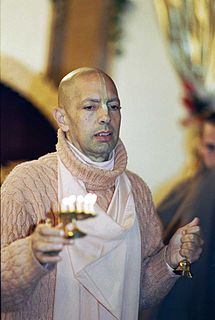A Quote by Mahatma Gandhi
The Vedas are as indefinable as God and Hinduism.
Quote Topics
Related Quotes
The apparent multiplication of gods is bewildering at the first glance, but you soon discover that they are the same GOD. There is always one uttermost God who defies personification. This makes Hinduism the most tolerant religion in the world, because its one transcendent God includes all possible gods. In fact Hinduism is so elastic and so subtle that the most profound Methodist, and crudest idolater, are equally at home with it.
Whenever I have read any part of the Vedas, I have felt that some unearthly and unknown light illuminated me. In the great teaching of the Vedas, there is no touch of sectarianism. It is of all ages, climbs, and nationalities and is the royal road for the attainment of the Great Knowledge. When I read it, I feel that I am under the spangled heavens of a summer night.
Through Hinduism, I feel a better person. I just get happier and happier. I now feel that I am unlimited, and I am more in control of my own physical body. The thing is, you go to an ordinary church and it's a nice feeling. They tell you all about God, but they don't show you how the way. They don't show you how to become Christ-concious yourself. Hinduism, however, is different.
In India the mother is the center of the family and our highest ideal. She is to us the representative of God, as God is the mother of the universe. It was a female sage who first found the unity of God, and laid down this doctrine in one of the first hy mns of the Vedas. Our God is both personal and absolute, the absolute is male, the personal, female. And thus it comes that we now say: 'The first manifestation of God is the hand that rocks the cradle'.




































